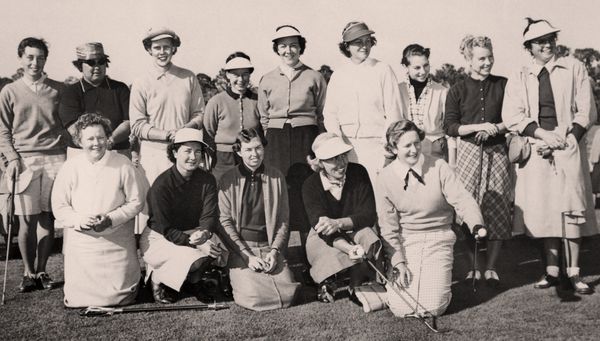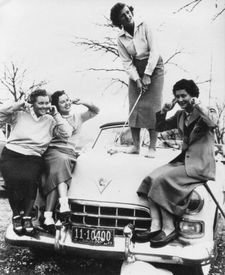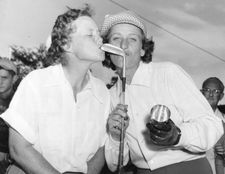 |
| The Founders |
Charlene Fisk and Carrie Schrader’s documentary The Founders arrived at this year’s Edinburgh International Film Festival as hot stuff. What might have slipped under the radar - ostensibly a modest little documentary about women’s golf, though it has a lot more going on beneath the surface – had been given an unexpectedly topical twist by the events of the previous months, when Muirfeld golf club, home of the Open, voted to maintain its ban on women being members. The Founders looks at the women who created the LPGA and first established women’s golf as a professional sport. Carrie is in Edinburgh to promote the film, so I start by asking her if she was interested in the sport before the project began.
“I do not have an interest in golf!” she states emphatically. “In fact, when Charlie asked me if I would work on this project with her I was very resistant because I thought, Oh no, I don’t want to sit through an hour and a half of a film about golf! But then, when I saw all the characters involved, I thought it was amazing. I realised that it wasn’t just about sport, it was about this group of underdogs who did something really profound that changed everything.”
 |
| An early publicity shot |
The story appealed to her because of its significance to the women’s movement, and because of the strong individual women involved. it was her co-director who first contacted those women.
“Charlie is an award-winning documentarian. She’s played golf for years. She saw a news article about the Founders and called Louise Suggs. Louise is an incredible curmudgeon and a really hard person to persuade, so she had to spend a long time talking to her about what she wanted to do. But then she talked to Marilyn Smith, who is the exact opposite of Louise, and she was really helpful. Then I came on board and we had to do it all over again, and write hand-written letters to everyone. I wanted to get the women to answer questions in a deeper way. They’ve been doing their own publicity all their lives so they have canned answers to a lot of things and I wanted to get beneath that, so I had to work to build camaraderies and get under that façade.”
That experience must have made them wary of the media too, I suggest, and she agrees – not just because of how they’d been represented, often with the focus on their looks and personal lives rather than their sporting ability, but because of all the times they’d been promised publicity that ultimately went nowhere.
“I don’t think they believed we’d actually go through with it,” she says. “They didn’t understand what they had done, they just feel like they did what needed to be done. No-one really knows this story. It shocked me to see the full breadth of the story as it developed.”
One of the things that stood out to me about their story, I note, was the unfussy way they accommodated the needs of people facing other kinds of prejudice, such as African American women. This is a subject that’s smoothly handled in the film.
“I’m so glad you noticed!” Carrie says. “We did it smoothly because I’ve seen that so often in other films and we were very aware that we’re two white women and we didn’t want to tell this white story and then be, Oh, by the way, there’s these African American people too! It was important to show that they were integral to the story. And there’s so much to their stories, we could have made whole movies about Renee [Powell] and Althea [Gibson]. Their stories alone are utterly remarkable. We have versions with so much more about them but we could only really go down one lane, and ultimately the reason we didn’t make those movies is that other people already are – they’re out there, they’re in production.”
So has being around all these inspirational players changed her attitude to the sport?
“Now I’m very interested!” she declares happily. “Charlie continues to play and I have a daughter who’s two and a half and I can’t wait to get her out on the course, now that I know that you don’t need to have money and you don’t need to be a certain class and you don’t need to be a man, and I think it instils patience and confidence so it’s a good thing to learn. It’s inspiring to see group of people who went out and did something that was about what felt right in their soul.”
 |
| The Founders |
Audiences have been similarly inspired, she says.
“We’ve had people who didn’t want to watch the film because it was about golf but then realised there was this whole other thing there, and people who love golf who feel the same way. I think ultimately it’s about redemption and everyone can understand what that means, trying so hard and being willing to just go for it.”
Despite all the women’s efforts, in their day the media still focused more on their looks than their ability. Did that have an impact on how she approached selecting footage to use in the film?
“It did. We wanted to show all sides of them and show exactly who they were... of course women are still considered for looks now, we are still in that place, with the financial discrepancy between what men and women make. We have so much privilege now, so much more than they did, but it can still be hard and we felt that being women in the film industry, making a film about women. And about older women, too. So we were facing some of the same battles as they did in a way, in a different context, in the film industry.” Did that make it harder to raise the funds needed to make the film? “Yes! Oh, it’s just constant. We’re still fundraising now, trying to raise funds to pay back theatrical costs and get it on screen.”
For all this, she clearly feels that making the film has been worthwhile. The Muirfield incident just adds to that sense, so I ask for her thoughts about it.
“We really hope that they watch the film!” she says. “We’re really trying to get them to see it because we think that if the men and the board members saw it then they’d realise what women did for the game of golf. Also, you know, except for the top one percent super players, which, let’s face it, most men are never going to be, men say that they learn most from watching women, because they learn about strategy and the short game. I wish those men could walk a mile in their shoes and understand that it’s a loss for them if they don’t let women join.”
The Founders is released in the UK on 5 August.





















